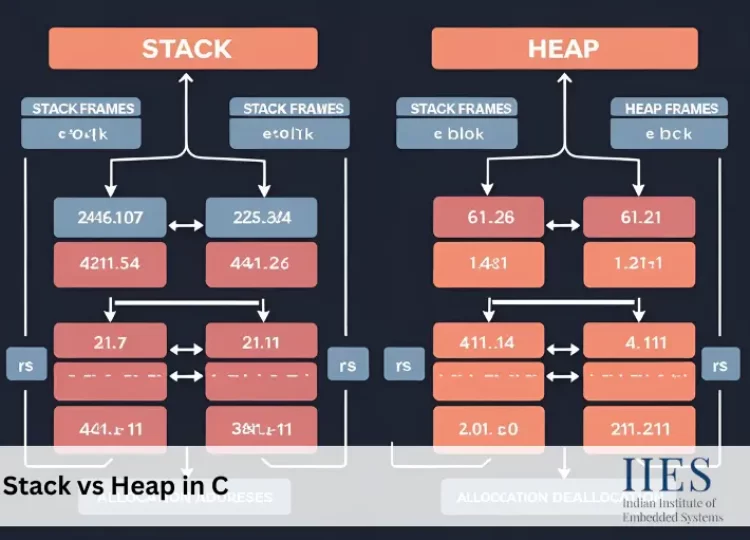What Is Stack and Heap Memory in C?
In C programming, memory is divided into several regions, and two of the most important are:
- Stack – stores temporary data like local variables and function calls.
- Heap – handles dynamic memory allocation.
These two memory types serve different purposes, behave differently, and must be used correctly to prevent issues such as memory leaks or crashes.

Stack vs Heap in C Programming – A Quick Overview
| Property | Stack | Heap |
|---|
| Usage | Function calls, local variables | Dynamic memory allocation |
| Allocation | Automatic by compiler | Manual using malloc, calloc, etc. |
| Speed | Very fast | Slower |
| Memory Size | Limited (usually ~1MB) | Larger (depends on system memory) |
| Lifetime | Ends when function exits | Persists until you call free() |
| Storage Style | LIFO (Last In, First Out) | Randomly managed |
How Stack Memory Works in C
The stack is a section of memory used to manage temporary variables created by functions. When a function runs, its local variables are stored in the stack, and this memory is automatically released once the function completes.
Example – Stack Allocation in C
#include
void greet() {
int age = 18;
char letter = 'S';
printf("Age: %d, Letter: %c\n", age, letter);
}
int main() {
greet();
return 0;
}
In this code, age and letter are stored in the stack. This memory doesn’t require manual allocation or deallocation, as it’s managed automatically by the system.

How Heap Memory Works in C
The heap is used when you don’t know how much memory you’ll need at compile time. You can request memory at runtime using functions like malloc, and it stays allocated until you explicitly free it.
Example – Heap Memory in C Using malloc
#include
#include
int main() {
int *ptr = (int*)malloc(sizeof(int));
if (ptr == NULL) {
printf("Memory not allocated!\n");
return 1;
}
*ptr = 100;
printf("Value: %d\n", *ptr);
free(ptr);
return 0;
}
Here, ptr points to memory in the heap. You must manually release it using free() — forgetting to do this leads to memory leaks.
Difference between stack and heap Memory Allocation
| Feature | Stack | Heap |
|---|
| Managed By | Compiler | Programmer |
| Lifetime | Short (function-level) | Long (until manually freed) |
| Risk | Stack overflow | Memory leak, dangling pointer |
| Use Case | Temporary, small variables | Large or dynamic memory needs |
| Flexibility | Low | High |
Malloc vs Stack Allocation
Choosing between malloc (heap) and stack depends on your use case.
| Factor | Stack | Heap (malloc) |
|---|
| Memory control | Automatic | Manual |
| Use case | Local variables | Dynamic data structures |
| Speed | Faster | Slower |
| Safety | Less prone to leaks | Needs careful memory management |
When Should You Use Stack or Heap?
Use stack memory when:
- You’re working with small variables
- You don’t need the data after a function ends
- Speed is important
Use heap memory when:
- You require memory that remains available even after the function finishes executing
- You’re creating complex structures like trees or linked lists
- The amount of memory isn’t known in advance
Summary – Stack vs Heap in C
| Comparison | Stack | Heap |
|---|
| Memory Type | Automatic | Manual |
| Speed | Fast | Slower |
| Lifetime | Until function ends | Until free() is called |
| Common Use | Local variables, function calls | Dynamic data, custom structures |
| Common Errors | Stack overflow | Memory leak, dangling pointers |
Common Mistakes to Avoid
- Not freeing heap memory → Leads to memory leaks
- Using freed memory → Causes undefined behavior
- Too much recursion → Can crash the program (stack overflow)
- Ignoring malloc return value → May crash if allocation fails

Conclusion
Grasping the difference between stack and heap memory in C helps you write better, more efficient programs. Stack is great for quick, short-term tasks, such as storing local variables, while the heap provides more flexibility for dynamic memory needs. Especially in embedded systems where memory is limited, knowing when and how to use each type is crucial. By making smart choices and avoiding common pitfalls like memory leaks or stack overflows, you’ll manage memory confidently and build more reliable applications.




